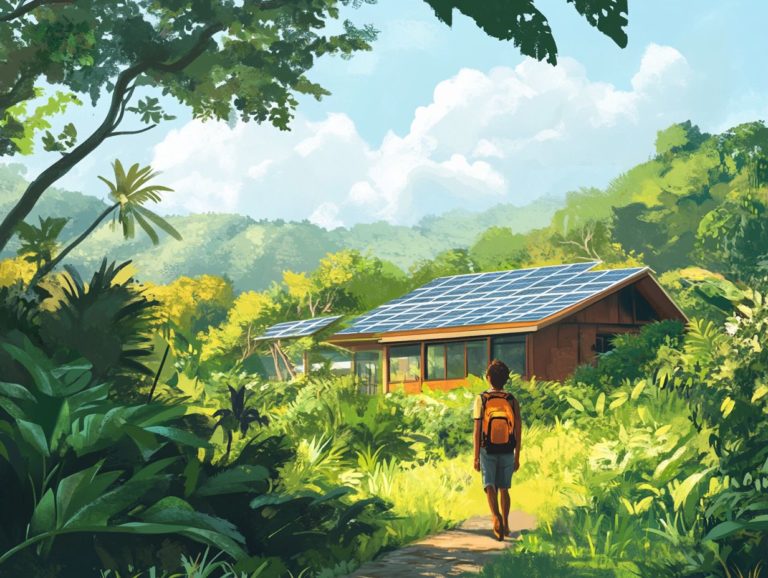5 Tips for Sustainable Camping Adventures
Camping is a cherished tradition that allows many to step away from the hustle and bustle of daily life. It provides an opportunity to reconnect with the wonders of nature, especially through eco-friendly camping methods.
As outdoor enthusiasts, it s crucial to consider your impact on the environment. Embracing sustainable camping practices preserves the beauty of our landscapes and ensures that future generations can relish them just as you do while respecting natural habitats.
Get ready for five exciting tips to make your camping more eco-friendly! Explore how to make your next camping adventure both enriching and responsible!
Contents
Key Takeaways:

- Choose a campsite that values sustainability.
- Pack light with reusable items to reduce waste!
- Use solar panels and rechargeable batteries to lessen your impact.
1. Choose a Sustainable Campsite
Choosing a sustainable campsite is your pivotal first step as an eco-conscious camper. By doing so, you not only minimize your impact on the environment but also respect the natural habitats around you. A well-selected site promotes protecting nature while enjoying the outdoors.
Evaluate eco-friendly campground facilities when selecting your site. Look for facilities like composting toilets (toilets that turn waste into compost, reducing pollution) and solar-powered amenities to significantly reduce resource consumption. Prioritize locations that emphasize local sourcing for supplies, ensuring that everything, from your food to firewood, supports the surrounding community.
Camping in areas dedicated to environmental conservation enriches your experience. These sites often offer educational programs about local ecosystems. To gauge a campground’s commitment to sustainability, seek out certifications or awards related to green practices, read reviews from fellow campers, and don’t hesitate to reach out to the staff for insights into their environmental initiatives. Additionally, incorporating 7 tips for sustainable travel photography can enhance your outdoor experience while respecting nature.
2. Pack Light and Bring Reusable Items
Packing light and opting for reusable items are essential eco-friendly camping practices. These choices not only minimize waste but also help you reduce your impact on the environment during outdoor adventures.
By choosing gear like reusable dishes, durable containers, and natural body products, you save space while ensuring you’re not creating unnecessary waste. Selecting lightweight and multifunctional items greatly enhances your experience. For instance, a compact cookset can streamline meal preparation, eliminating the need for disposable products.
To ensure your camping trip aligns with sustainability, make sure your camping checklist includes essentials like:
- Collapsible bowls
- Refillable water bottles
- Biodegradable toiletries
These choices contribute to a sustainable approach to camping that aligns with eco-friendly techniques you can feel good about.
3. Use Alternative Energy Sources
Using alternative energy sources like solar panels can transform your camping experience. It s perfect for eco-conscious campers who want to promote energy conservation and respect nature.
Integrating solar technology into your camping gear allows you to power devices such as lights, cookers, and portable refrigerators. This method reduces reliance on harmful fossil fuels.
Using solar energy helps you connect with nature and contribute to environmental preservation. Enjoy the beauty of the outdoors, knowing your choices support future generations.
4. Leave No Trace Behind

The ‘Leave No Trace’ principles are vital for eco-friendly camping. They help you minimize your environmental impact and respect wildlife.
By following these principles, you can journey without harming nature. Here are seven core guidelines to consider:
- Plan ahead and prepare.
- Travel and camp on durable surfaces.
- Dispose of waste properly.
- Leave what you find.
- Minimize campfire impact.
- Respect wildlife.
- Be considerate of other visitors.
These guidelines remind you to respect the environment. When managing your waste, using biodegradable soap, compost bins, and packing out all trash can significantly reduce pollution. For more detailed information, check out camping responsibly: best practices for nature.
Regarding wildlife, maintaining a safe distance and properly storing food in bear-proof containers protects both you and the animals in the area.
Being aware of your environmental impact enhances your outdoor experience. It also fosters a deeper connection to the natural world.
5. Support Local Businesses and Communities
Supporting local businesses is key to sustainable living. It enhances your camping experience and connects you to the environment and local community.
Choosing local food and camping supplies helps strengthen the local economy. This benefits local farmers and artisans, keeping the region vibrant.
Buying from nearby breweries gives you fresher and more flavorful choices. It also supports sustainable agricultural practices in your community.
These choices create unforgettable experiences that celebrate nature and the rich local culture. It s a way to honor outdoor ethics.
What Is Sustainable Camping and Why Is It Important?
Sustainable camping is all about embracing outdoor practices that prioritize environmental conservation. It utilizes eco-friendly methods while minimizing your ecological footprint. It emphasizes eco-friendly camping methods, responsible behaviors, and outdoor ethics that honor nature, promote energy conservation, and respect wildlife.
By following these principles, you can greatly lessen your impact on nature. This ensures that future generations will enjoy the same breathtaking natural wonders. Traditional camping often leads to negative consequences such as soil erosion, wildlife disturbances, and pollution.
In fact, studies show that over 50% of campsites exhibit signs of degradation caused by human activities, including soil erosion and pollution. This reality shows just how crucial it is to adopt sustainable practices, which not only help preserve essential resources but also foster a deeper connection to the environment.
Sustainable camping encourages proper waste disposal, which includes minimizing food waste and using biodegradable products. It also promotes habitat preservation, making it vital for maintaining the health of our precious natural ecosystems. For those looking for ideal locations, check out eco-friendly camping: top spots.
What Are the Environmental Impacts of Traditional Camping?
Traditional camping can significantly impact the environment, from plastic waste to food scraps and disturbances to local wildlife. This highlights the need for eco-conscious campers to adopt sustainable practices.
For example, leaving behind food scraps can lure wildlife into campsites, leading to potentially dangerous encounters and disrupting natural animal behaviors. This underscores the importance of wildlife respect.
The reliance on single-use plastics such as water bottles and food wrappers adds to pollution that can persist in delicate ecosystems for centuries. Conventional camping often involves cutting down trees for firewood or trampling native plants, resulting in habitat destruction and depletion of vital resources.
By adopting methods like Leave No Trace principles guidelines that help outdoor enthusiasts minimize their impact on nature and opting for sustainable gear made from durable materials, you can play a part in mitigating these damaging effects. Additionally, when planning your travels, consider following 7 tips for eco-friendly road trips. This ensures that natural spaces remain pristine for future generations to enjoy.
How Can Campers Reduce Their Carbon Footprint?

You can effectively reduce your carbon footprint while enjoying the great outdoors by embracing various eco-friendly tips, including DIY snacks and practices that promote energy conservation and the use of renewable resources.
Opt for sustainable transportation options, like carpooling or public transit, to reach your camping destination. This small choice can significantly lower the emissions associated with your travel.
Once you arrive at the campsite, harness clean energy by using solar-powered lights and portable solar chargers, which help minimize your reliance on fossil fuels.
Be mindful of waste by implementing proper recycling and composting practices to ensure that the natural beauty around you remains pristine. Remember, every individual choice you make, no matter how small, contributes to the larger efforts of environmental conservation.
This fosters a sense of collective responsibility in preserving the great outdoors for generations to come. Join us in protecting our beautiful outdoors by adopting these traveling off-grid eco-conscious adventure tips!
What Are Some Examples of Sustainable Camping Practices?
Sustainable camping practices encompass a variety of eco-friendly methods, including using biodegradable products and taking advantage of recycling facilities available at campgrounds. These practices are designed to minimize your environmental impact.
By implementing practices such as composting food waste, you can significantly reduce trash while enriching the soil for future vegetation. Following campground rules protects the natural habitat and cultivates a respectful community atmosphere among fellow campers.
These mindful efforts like opting for biodegradable soap and employing proper waste disposal techniques contribute to a healthier ecosystem that encourages local wildlife to thrive. When you embrace these sustainable methods, you inspire others to follow suit, creating a ripple effect that promotes responsible outdoor recreation and ensures these stunning landscapes remain pristine for generations to come.
How Can Campers Educate Others on Sustainable Camping?
Campers hold a crucial position in educating others about sustainable camping practices. They can use their experiences to raise environmental awareness and foster responsible outdoor ethics within their communities.
By leveraging the capabilities of social media, you can share impactful stories and valuable tips that resonate with a wider audience. Organizing workshops allows you to create immersive learning environments and interact directly with fellow campers and the local community.
Leading by example in the field showcases best practices, such as Leave No Trace principles, turning sustainability from a lofty ideal into a shared commitment. Ultimately, cultivating a culture of sustainability relies on community engagement, where each camper plays a role in a collective effort that inspires and educates others about the importance of respecting nature.
What Are Some Resources for Planning a Sustainable Camping Trip?
Numerous resources await you as you plan a sustainable camping trip. These offer invaluable tips, checklists, and eco-friendly techniques that elevate your outdoor experience while minimizing your environmental impact.
Using these tools can make a remarkable difference in how you connect with nature and protect it for future generations. Websites like the Leave No Trace Center for Outdoor Ethics provide comprehensive guidelines on responsible camping practices, while apps such as AllTrails help you discover eco-conscious trekking tips for sustainable hiking tailored to your adventure.
Books like “The Ultimate Guide to Camping and Ecology” delve deeply into sustainable methods and practices, enriching your knowledge. By incorporating these resources, including discovering the best eco-friendly campsites, you can get excited about being well-prepared, turning your outdoor escapades into both enjoyable experiences and environmentally conscious endeavors.
Frequently Asked Questions

What are 5 tips for sustainable camping adventures?
1. Leave no trace: Always remember to clean up after yourself and leave the campsite as you found it. This includes properly disposing of trash and waste.
2. Choose reusable and eco-friendly products: Instead of disposable plates and utensils, opt for reusable and biodegradable options. Also, select eco-friendly camping gear made from sustainable materials.
3. Conserve water: Water is a precious resource, especially when camping. Use it sparingly and always dispose of it properly. Look for ways to reuse water, such as using it for dishwashing or watering plants.
4. Respect wildlife: While camping, it’s important to respect the natural habitat and wildlife by not disturbing animals or leaving out food that can attract them.
5. Choose sustainable transportation: Consider carpooling, taking public transportation, or even biking to your camping destination. This reduces carbon emissions and helps preserve the environment.
How can I leave no trace while camping?
Leaving no trace means leaving the campsite without any evidence that you were there. This includes properly disposing of trash, not disturbing the natural environment, and leaving any natural objects, such as rocks and plants, where you found them.
Why Use Reusable and Eco-Friendly Products When Camping?
Using reusable and eco-friendly products cuts down on waste. Single-use items, like plastic plates, can take hundreds of years to break down and lead to pollution.
How to Conserve Water While Camping
Conserving water is simple. Turn off the faucet while brushing your teeth and take quick showers.
You can also collect rainwater for washing dishes and use biodegradable soap. This type of soap breaks down naturally and is less harmful to the environment.
What to Do if You Encounter Wildlife
If you see wildlife, observe from a safe distance. Never disturb them or leave food out that could attract animals.
Always dispose of waste properly. Follow guidelines in designated camping areas to ensure safety.
Enjoying the Outdoors Sustainably
You can have an amazing camping adventure without harming the planet. Follow the tips above to stay mindful of your impact.
Look for eco-friendly camping options, like campgrounds that use renewable energy. Embrace nature and protect it at the same time!






